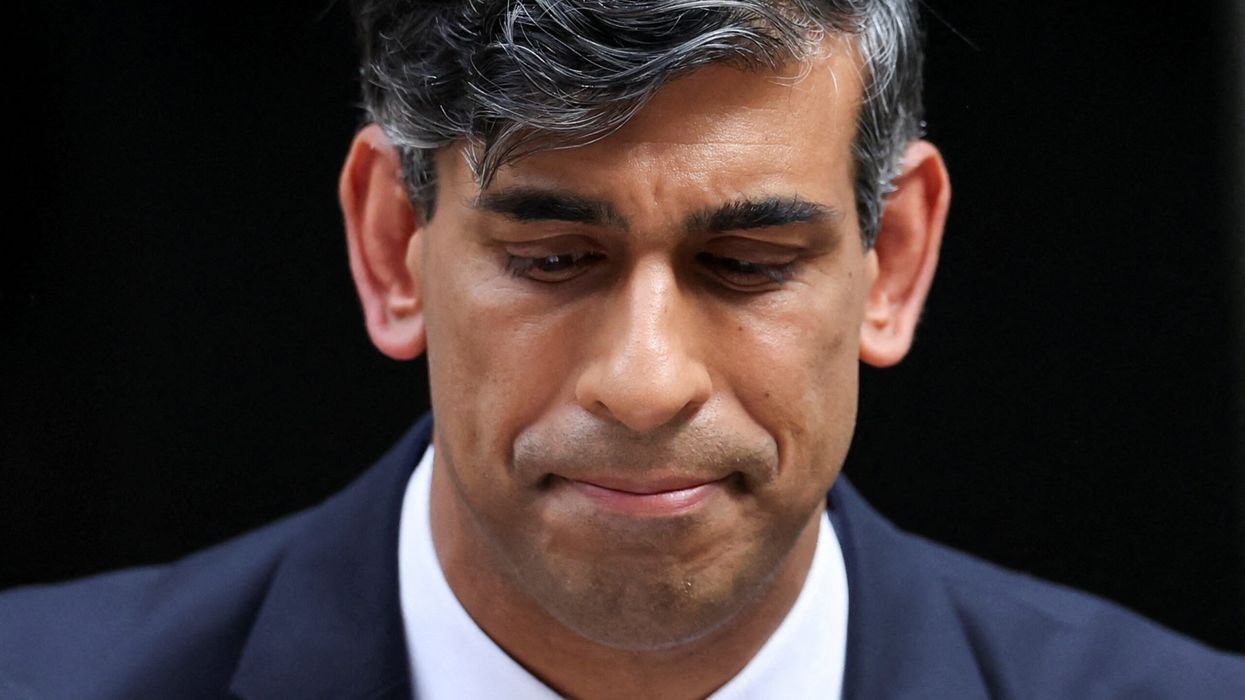Rishi Sunak apologised to the public on Friday after the Conservatives were defeated by Labour in the election and announced his resignation as party leader.
"To the country, I would like to say first and foremost, I am sorry," Sunak said outside Downing Street before going to Buckingham Palace to resign as prime minister to King Charles. "I have given this job my all, but you have sent a clear signal that the government of the United Kingdom must change. And yours is the only judgement that matters."
"I have heard your anger, your disappointment, and I take responsibility for this loss," he continued. "To all the Conservative candidates and campaigners who worked tirelessly but without success, I'm sorry that we could not deliver what your efforts deserved. It pains me to think how many good colleagues who contributed so much to their communities and our country will now no longer sit in the House of Commons. I thank them for their hard work and their service."
Sunak, 44, decided to call the election six months early, hoping that improved economic data would garner support for the Tories. However, the vote on Thursday showed that Britons wanted to remove the party from power after 14 years of economic difficulties, Brexit issues, and internal conflicts.
The scale of the defeat meant Sunak, the Conservative party's fifth leader since 2010, had to step down. He said he would remain in the role until arrangements were made for an internal leadership contest, expected to be a significant ideological battle for the party.
Many top ministers in Sunak's team lost their seats, including defence secretary Grant Shapps and House of Commons Leader Penny Mordaunt. His immediate predecessor as prime minister, Liz Truss, also lost her seat.
"When I first stood here as your prime minister, I told you the most important task I had was to return stability to our economy. Inflation is back to target, mortgage rates are falling, and growth has returned. We have enhanced our standing in the world, rebuilding relations with allies, leading global efforts to support Ukraine, and becoming the home of a new generation of transformative technologies. Our United Kingdom is stronger too, with the Windsor framework, devolution restored in Northern Ireland, and our union strengthened. I am proud of those achievements," Sunak said.
"I believe this country is safer, stronger, and more secure than it was twenty months ago, and it is more prosperous, fairer, and resilient than it was in 2010," he added.
Sunak, Britain's first prime minister of colour and an observant Hindu, wished his successor Keir Starmer well, calling him "a decent, public-spirited man who I respect." He said, "Whilst he has been my political opponent, Sir Keir Starmer will shortly become our prime minister. In this job, his successes will be all of our successes, and I wish him and his family well. Whatever our disagreements in this campaign, he is a decent, public-spirited man who I respect."
Sunak expressed gratitude to his colleagues, his cabinet, the civil service, and his family. "I would like to thank my colleagues, my cabinet, the civil service, especially here in Downing Street. The team at Chequers, my staff, CCHQ, but most of all I would like to express my gratitude to my wife Akshata and our beautiful daughters. I can never thank them enough for the sacrifices they have made, so that I might serve our country."
"One of the most remarkable things about Britain is how unremarkable it is that two generations after my grandparents came here with little, I could become prime minister and that I could watch my two young daughters light Diwali candles on the steps of Downing Street. We must hold true to that idea of who we are. That vision of kindness, decency, and tolerance that has always been the British way."
"This is a difficult day at the end of a number of difficult days, but I leave this job honoured to have been your prime minister. This is the best country in the world, and it is thanks entirely to you, the British people, the true source of all our achievements, our strengths, and our greatness. Thank you," Sunak concluded.
Indian prime minister Narendra Modi thanked Sunak for his contribution to deepening ties between India and the UK. "Thank you @RishiSunak for your admirable leadership of the UK, and your active contribution to deepen the ties between India and the UK during your term in office. Best wishes to you and your family for the future," Modi wrote on X (formerly Twitter).





